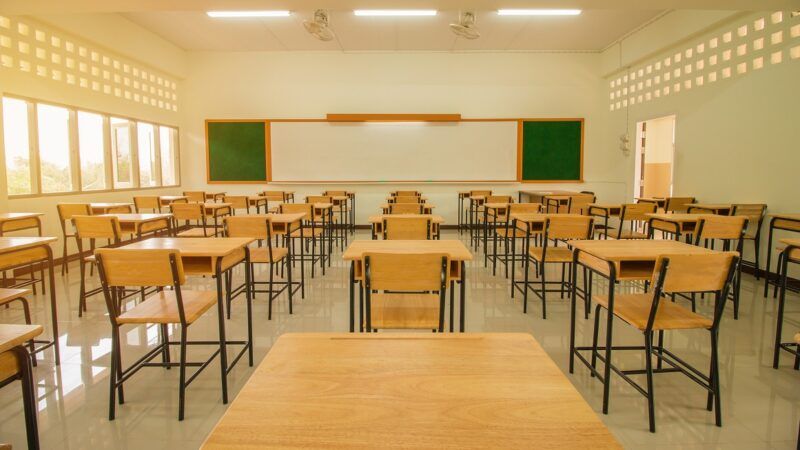School Choice Picks Up Steam After Pandemic Closures
Unresponsive government institutions fuel state-level measures to help parents and children pick learning models that suit them.

Among the victims of the COVID-19 pandemic we can probably count Americans' faith in government-dominated education. Through months of closures, teachers union obstinacy, and simple failure to deliver value to children, public schools have driven many families to look elsewhere for the care and feeding of young minds. The result has been rising support for school choice and a flurry of state-level measures to help parents and children pick learning models that suit them—measures that will remain long after the virus is gone.
"The Arkansas House on Wednesday narrowly approved a $2 million state income tax credit program to fund private school scholarships for needy students, sending the bill to Gov. Asa Hutchinson," the Arkansas Democrat Gazette reported on April 22. Hutchinson supports the measure, so its approval is basically guaranteed. The bill creates dollar-for-dollar income tax credits, up to a modest $2 million cap for the whole state, for donors to organizations that provide scholarships to pay for private school tuition. To qualify for those scholarships, students must have a family income equal to or less than 200 percent of the federal poverty level (currently $53,000 a year for a household with four people).
Even as Arkansas lawmakers passed the tuition tax credit plan, their counterparts in Florida approved a proposal to consolidate scholarship programs and expand eligibility to include more families.
"The Florida House voted to expand the state's school voucher programs Wednesday, opening up scholarships created to help children living in poverty to youngsters from families earning nearly $100,000 a year," according to the Orlando Sentinel.
North Carolina's House voted to expand the state's voucher program earlier this month; the measure is now in the Senate. Elected officials in Kentucky and West Virginia beat them to the punch, approving plans to let education dollars follow children to their chosen education options, rather than just funneling them to government institutions. To further illustrate where the momentum lies, West Virginia also expanded authorization for charter schools, while Kentucky lawmakers overrode Gov. Andy Beshear's veto to implement their plan. And those states are far from the full story of school choice progress.
The reason isn't difficult to discern. Public schools completely dropped the ball during the pandemic, leaving kids languishing and parents frustrated and angry.
"The pandemic has been a revelation for many Americans about union control of public schools that refuse to reopen," The Wall Street Journal's editorial board pointed out last month, before the most recent developments. "Nearly 50 school-choice bills have been introduced this year in 30 states. It's a testament to how school shutdowns have made the advantage of education choice more evident, and its need more urgent."
That's a massive turnaround from the success teachers unions enjoyed just a few years ago with their national #RedForEd strikes. They briefly had officials on the ropes with their demands for money and political power. Then they squandered their position and lots of good will by fighting to keep schools closed during the pandemic and lashing out at parents who disagree. They damaged not just their own standing, but that of the quasi-monopoly government schools that they control.
Polling supports that point. While school choice has gained ground over the years, it really picked up steam through the months of shuttered schools and idled children.
"71% of voters back school choice," the American Federation for Children announced earlier this month about the results of a recent survey. "This is the highest level of support ever recorded from major AFC national polling with a sample size above 800 voters."
"65% support parents having access to a portion of per-pupil funding to use for home, virtual, or private education if public schools don't reopen full-time for in-person classes," the organization added, noting support for exactly the sort of programs gaining ground in states including Arkansas, Florida, Kentucky, North Carolina, and West Virginia.
Even in the absence of portable education funding, families are matching their sentiments with their actions. In October, NPR found enrollment in public schools unexpectedly dropping across 20 states.
"Large and small, rich and poor, urban and rural — in most of these districts the decline is a departure from recent trends," NPR's Anya Kamenetz noted.
By contrast, enrollment in private schools, which offer options that cater to varying family preferences, held steady or increased during months of shutdowns. That flew in the face of researchers' expectations that the economic stress of the last year would have driven away families challenged to pay tuition bills.
"In our sample, 70 percent of independent schools experienced increases in enrollment or level enrollments during the pandemic recession," according to a study from Georgia's Kennesaw State University.
Publicly funded but privately managed charter schools have also largely fared well with flexible policies that suit different families.
"We understood that charter schools didn't have to follow the public schools' calendar, or its rules and regulations, and we had heard public schools may not even open," one parent told PBS's Frontline.
Government data reveals that the ranks of homeschoolers more than tripled from 3.3 percent of students before the pandemic to 11.1 percent as of the most recent information.
"[T]he global COVID-19 pandemic has sparked new interest in homeschooling and the appeal of alternative school arrangements has suddenly exploded," observed Census Bureau researchers Casey Eggleston and Jason Fields.
Parents and children, it seems, have decided in large numbers that they want out of unresponsive government schools and eased access to education that suits their needs. Many have already made the move, and others are poised to do the same if they can extract their money from institutions they're ready to abandon. With a new flurry of school choice programs, lawmakers across the country are catching up with their constituents.


Show Comments (67)